I have authored four books: Entrepreneurship and Evolutionary Economics (Cambridge University Press, 2025) that is an elaboration on what entrepreneurship means in the market process and to economic growth; How to Think about the Economy: A Primer (Mises Institute, 2022) that is an introduction to economic reasoning and the study of the economy with a focus on economic literacy; The Seen, the Unseen, and the Unrealized: How Regulations Affect Our Everyday Lives (Lexington, 2016) that provides the reader with an introduction to economic reasoning to understand the market and regulation; and The Problem of Production: A New Theory of the Firm (Routledge, 2015) on the economic theory of organization and the firm.
I also edited A Modern Guide to Austrian Economics (Edward Elgar, 2022) and co-edited Research Handbook on Austrian Economics in Management and Entrepreneurship (Edward Elgar, 2025) with Vishal Gupta and The Next Generation of Austrian Economics: Essays in Honor of Joseph T. Salerno (Mises Institute, 2015) with David Howden.
Under contract
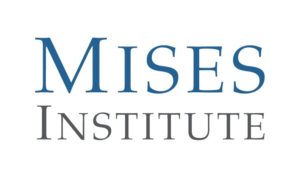 The Economics of Human Action (Mises Institute). Edited/abridged version of the scholar’s edition of Mises’s Human Action.
The Economics of Human Action (Mises Institute). Edited/abridged version of the scholar’s edition of Mises’s Human Action.
.
 Austrian Price Theory (Cambridge University Press). Part of the Austrian Economics elements series edited by Peter Boettke. Expected 2026.
Austrian Price Theory (Cambridge University Press). Part of the Austrian Economics elements series edited by Peter Boettke. Expected 2026.
.
Authored books
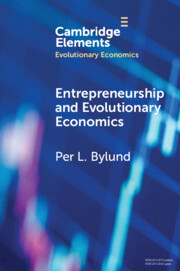 Entrepreneurship and Evolutionary Economics (Cambridge University Press, 2025). Entrepreneurship has been expunged from contemporary mainstream economics despite being an important driver and cause of economic development and growth. However, whereas Evolutionary Economics recognizes value-creative entrepreneurship, its role and impact tend to still be understated and the vast implications not fully understood. This Element attempts to remedy this by theorizing on how entrepreneurship impacts and drives market economies, the implications for economic change and renewal, and how the pursuit of new value creation determines the evolution of an economy. We find that allowing for entrepreneurial new value creation – innovative entrepreneurship – produces a different and more dynamic understanding of the market as a process, the role of knowledge and uncertainty, economic evolution and progress, as well as has important implications for political economy. The book is part of the CUP Elements series on Evolutionary Economics.
Entrepreneurship and Evolutionary Economics (Cambridge University Press, 2025). Entrepreneurship has been expunged from contemporary mainstream economics despite being an important driver and cause of economic development and growth. However, whereas Evolutionary Economics recognizes value-creative entrepreneurship, its role and impact tend to still be understated and the vast implications not fully understood. This Element attempts to remedy this by theorizing on how entrepreneurship impacts and drives market economies, the implications for economic change and renewal, and how the pursuit of new value creation determines the evolution of an economy. We find that allowing for entrepreneurial new value creation – innovative entrepreneurship – produces a different and more dynamic understanding of the market as a process, the role of knowledge and uncertainty, economic evolution and progress, as well as has important implications for political economy. The book is part of the CUP Elements series on Evolutionary Economics.
***
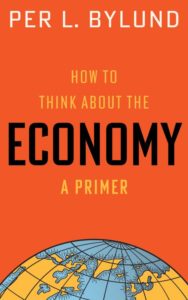 How to Think about the Economy: A Primer (Mises Institute, 2022). This little book was written to accomplish something big: economic literacy. It is intentionally kept very short to be inviting rather than intimidating, as economics books typically are. You will gain an understanding of how the economy works in practically no time. Hopefully, this book will make you excited about what economics has to offer, because economic literacy is mind-opening. Sound economic reasnoning is an enormously powerful tool for understanding both the economy and society. Economic literacy uncovers what is going on under the surface and why things work out as they do. There is no magic to it. In fact, economic literacy is necessary to properly understand the world we live in.
How to Think about the Economy: A Primer (Mises Institute, 2022). This little book was written to accomplish something big: economic literacy. It is intentionally kept very short to be inviting rather than intimidating, as economics books typically are. You will gain an understanding of how the economy works in practically no time. Hopefully, this book will make you excited about what economics has to offer, because economic literacy is mind-opening. Sound economic reasnoning is an enormously powerful tool for understanding both the economy and society. Economic literacy uncovers what is going on under the surface and why things work out as they do. There is no magic to it. In fact, economic literacy is necessary to properly understand the world we live in.
Published translations (chron. order):
경제에 관해 생각하는 방법. Busan, Republic of Korea: Liberty Publishing House. Translated to Korean by Sooyoun Hwang.
Cómo pensar a Economía. Mexico City, Mexico: Centro Ricardo Salinas Pliego. Translated to Spanish by Axel Kaiser.
Como pensar a Economia: Uma introdução. São Paulo, Brazil: LVM Editora. Translated to Portuguese by Fernando M. D’Andrea.
Johdatus taloudelliseen ajatteluun. Finland: Consensus Network. Translated to Finnish by Thomas Brand.
Hoe te denken over economie. Amsterdam, the Netherlands: Mises Instituut Nederland. Translated to Dutch by Yoep Roth.
如何认识经济:9堂经济学常识课. People’s Republic of China: Zhejiang People’s Publishing House. Translated to Mandarin Chinese by 张是之.
Was man über Wirtschaft wissen sollte. Für Einsteiger. Vienna, Austria: Hayek Institut. Translated to German by Victoria Schmid.
Comment penser l’économie? Paris, France: Liberté et Capitalisme. Translated to French by Alexis Sémanne.
როგორ ვიფიქროთ ეკონომიკაზე. Tbilisi, Georgia. Translated to Georgian by Nodar Chinchaladze.
چگونه به اقتصاد بیندیشیم. Tehran, Iran. Translated to Persian (Farsi) by Amir Alavifar.
Coming soon: Danish, Japanese, Swedish, Turkish.
***
 The Seen, the Unseen, and the Unrealized: How Regulations Affect Our Everyday Lives. (Lexington, 2016) This book illuminates the effects of regulations on people’s everyday lives by working through the ripple effects of changes. Thus, the book provides a fundamental understanding of the economy as an organism rather than a machine and enlightens the reader by offering a model for understanding the economy and market. Regulations, which are restrictions placed on the working of the economy, have consequences—this book emphasizes the real effects of regulation and market change on individual actors, thereby stressing how the economy works to provide an individual with the options that exist in choice situations.
The Seen, the Unseen, and the Unrealized: How Regulations Affect Our Everyday Lives. (Lexington, 2016) This book illuminates the effects of regulations on people’s everyday lives by working through the ripple effects of changes. Thus, the book provides a fundamental understanding of the economy as an organism rather than a machine and enlightens the reader by offering a model for understanding the economy and market. Regulations, which are restrictions placed on the working of the economy, have consequences—this book emphasizes the real effects of regulation and market change on individual actors, thereby stressing how the economy works to provide an individual with the options that exist in choice situations.
***
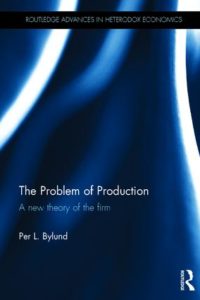 The Problem of Production: A New Theory of the Firm. (Routledge, 2016.) The theory of the firm has been fertile ground for economists. Bylund proposes a new theory, rooted in Austrian economics, which examines the firm as a part of the market, and not as a free-standing entity. In this integrated view, a theory is offered which incorporates entrepreneurship, production, market process and economic development.
The Problem of Production: A New Theory of the Firm. (Routledge, 2016.) The theory of the firm has been fertile ground for economists. Bylund proposes a new theory, rooted in Austrian economics, which examines the firm as a part of the market, and not as a free-standing entity. In this integrated view, a theory is offered which incorporates entrepreneurship, production, market process and economic development.
Edited Books
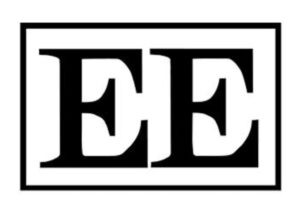 Research Handbook on Austrian Economics in Management and Entrepreneurship (Vishal K. Gupta and Per L. Bylund, eds.; Edward Elgar, 2025).
Research Handbook on Austrian Economics in Management and Entrepreneurship (Vishal K. Gupta and Per L. Bylund, eds.; Edward Elgar, 2025).
***
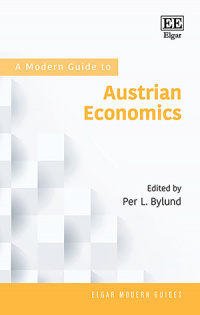 A Modern Guide to Austrian Economics (Per L. Bylund, ed.; Edward Elgar, 2022). This book is part of Edward Elgar’s Modern Guide series, and surveys the significant trends and issues of contemporary research in Austrian economics. A total of 15 chapters cover different theories and applications of Austrian economics. Authors include Peter Boettke, Peter G. Klein, Robert P. Murphy, and Joseph T. Salerno. For advanced students and academic researchers.
A Modern Guide to Austrian Economics (Per L. Bylund, ed.; Edward Elgar, 2022). This book is part of Edward Elgar’s Modern Guide series, and surveys the significant trends and issues of contemporary research in Austrian economics. A total of 15 chapters cover different theories and applications of Austrian economics. Authors include Peter Boettke, Peter G. Klein, Robert P. Murphy, and Joseph T. Salerno. For advanced students and academic researchers.
***
 The Next Generation of Austrian Economics: Essays in Honor of Joseph T. Salerno. (Per Bylund and David Howden, eds.; Ludwig von Mises Institute, 2015). This book is a celebratory volume honoring the work of a respected and beloved teacher. It signifies a flourishing career of significant achievement, and also the gratitude and well-wishes of his students. With chapters by Philip Bagus, Mateusz Machaj, Matthew McCaffrey, Peter G. Klein, and others.
The Next Generation of Austrian Economics: Essays in Honor of Joseph T. Salerno. (Per Bylund and David Howden, eds.; Ludwig von Mises Institute, 2015). This book is a celebratory volume honoring the work of a respected and beloved teacher. It signifies a flourishing career of significant achievement, and also the gratitude and well-wishes of his students. With chapters by Philip Bagus, Mateusz Machaj, Matthew McCaffrey, Peter G. Klein, and others.
